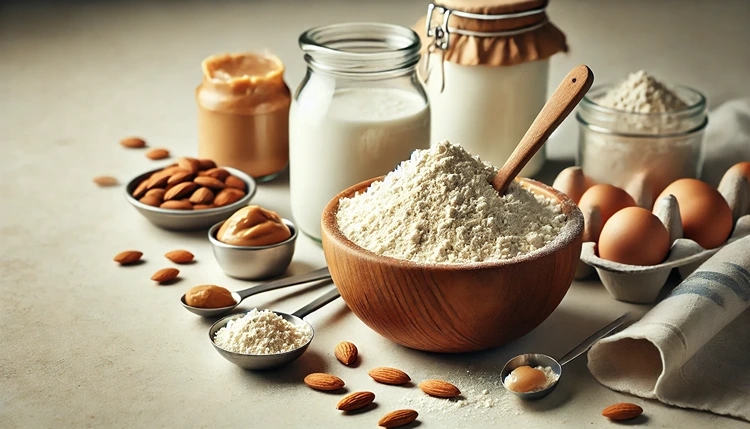There’s something magical about biting into a soft, chewy peanut butter cookie, especially when it’s completely vegan and made with almond flour. Whether you’re new to vegan baking or a seasoned pro, these cookies are an absolute must-try. They’re rich, indulgent, and filled with that classic peanut butter flavor you love—just without the dairy or eggs. Plus, using almond flour adds a slightly nutty depth that elevates the whole experience.
For those who are looking for healthier alternatives to traditional baked goods, swapping out all-purpose flour for almond flour is a game-changer. Not only does almond flour add great texture, but it’s also gluten-free and packed with healthy fats. These cookies come out soft and tender, with just the right amount of sweetness, and make for a perfect treat whether you’re vegan or not.
What Makes Almond Flour So Special?
You might be wondering, “Why almond flour?” Well, almond flour is made from finely ground blanched almonds, giving it a natural sweetness and a more nutrient-dense profile compared to regular flour. This flour is rich in vitamin E, healthy fats, and fiber, making it a healthier alternative for those who want to enjoy cookies without sacrificing nutrition. And because almond flour is gluten-free, it’s an excellent option for anyone avoiding gluten or looking for a low-carb treat.
But let’s be real: We’re here for the flavor. Almond flour adds a subtle nutty undertone to these vegan peanut butter cookies, perfectly complementing the rich peanut butter. The result is a cookie that’s soft and chewy on the inside, with just enough crispness on the outside. Seriously, it’s hard to eat just one!
Benefits of Using Almond Flour in Vegan Baking
| Benefit | Description |
|---|---|
| Gluten-Free | Almond flour is naturally gluten-free, making it a great option for those with gluten sensitivities or those following a gluten-free diet. |
| High in Protein | Compared to regular flour, almond flour is higher in protein, contributing to the overall nutritional value of your baked goods. |
| Rich in Healthy Fats | Almond flour contains heart-healthy monounsaturated fats, which can help lower bad cholesterol and reduce the risk of heart disease. |
| Low Glycemic Index | Almond flour has a lower glycemic index than traditional flours, meaning it won’t spike your blood sugar as quickly, making it a good option for diabetics. |
| Added Flavor | Almond flour brings a slightly nutty flavor to your baked goods, enhancing the overall taste without overpowering the recipe. |
| Moisture-Rich Texture | Due to its fat content, almond flour helps retain moisture in baked goods, resulting in a softer, richer texture. |
Ready to bake? Let’s walk through how to make these mouthwatering cookies step by step.
Soft Vegan Peanut Butter Cookies with Almond Flour
Ingredients
- 1 cup almond flour
- ½ cup natural peanut butter (unsweetened)
- ¼ cup coconut sugar
- 2 tablespoons maple syrup
- 1 teaspoon vanilla extract
- ½ teaspoon baking soda
- ¼ teaspoon sea salt
- 2 tablespoons almond milk (or any plant-based milk)
Instructions
- Preheat your oven to 350°F (175°C) and line a baking sheet with parchment paper.
- In a large bowl, mix the almond flour, baking soda, and salt together.
- In another bowl, whisk together the peanut butter, coconut sugar, maple syrup, vanilla extract, and almond milk until smooth.
- Combine the wet and dry ingredients, stirring until a dough forms. The dough should be soft and easy to work with.
- Roll the dough into small balls (about 1 tablespoon each) and place them onto the prepared baking sheet. Gently flatten each ball with a fork to create a criss-cross pattern on top.
- Bake for 10-12 minutes or until the edges are golden brown. The cookies will be soft, so let them cool on the baking sheet for a few minutes before transferring to a wire rack.
- Enjoy your soft, vegan peanut butter cookies with a glass of almond milk or your favorite plant-based drink!
Nutritional Information
- Calories: 150 per cookie
- Protein: 4g
- Fat: 11g
- Carbohydrates: 9g
- Fiber: 2g
What Makes These Cookies So Soft and Chewy?
The secret to soft and chewy vegan peanut butter cookies lies in the combination of ingredients. Almond flour gives these cookies their tender, melt-in-your-mouth texture, while the natural peanut butter adds richness and moisture. Coconut sugar and maple syrup work together to sweeten the cookies just enough without overpowering the nutty flavors.
Another trick? The almond milk helps bind everything together, ensuring the cookies don’t fall apart while still being soft enough to break easily when you bite into them. And don’t forget the criss-cross pattern! It not only makes these cookies look classic, but it also helps them bake more evenly.
Helpful Hint:
If you like your cookies on the chewier side, slightly underbake them by about a minute or two. They’ll firm up as they cool but still keep that soft, gooey texture on the inside.
Can I Make These Cookies without Peanut Butter?
Yes! While peanut butter is the star of the show, you can easily swap it out for other nut or seed butters if you have allergies or just want to try something different. Almond butter, cashew butter, or even sunflower seed butter will all work well in this recipe. Just make sure to choose a natural variety without added sugars or oils, as that can affect the texture and flavor of the cookies.
How to Store Vegan Peanut Butter Cookies
Storing these cookies is super simple. Once they’ve cooled completely, place them in an airtight container. They’ll stay fresh at room temperature for up to 4 days, but if you want to keep them longer, store them in the fridge for up to a week. You can also freeze them! Just pop them in a freezer-safe container, and they’ll last for up to 3 months. When you’re ready to enjoy, let them thaw at room temperature for about 10-15 minutes, or give them a quick zap in the microwave.
Helpful Hint:
If you freeze the dough instead of baked cookies, simply scoop out the dough into balls, freeze them on a baking sheet, and then transfer to a container once frozen. When you’re craving cookies, just bake them directly from frozen—just add an extra minute or two to the baking time.
Common Questions About Baking with Almond Flour
If you’re new to using almond flour in baking, you might have some questions. After all, it behaves differently from all-purpose flour or even other gluten-free flours. Let’s dive into some of the most common questions that pop up when working with almond flour in vegan baking.
Does Almond Flour Make Cookies Softer?
Yes, almond flour does tend to make cookies softer and more tender. Since almond flour is essentially ground almonds, it has a higher fat content than regular flour, which gives baked goods a more moist and rich texture. This is why it’s perfect for cookies, especially when you want them to be soft rather than crispy.
Almond flour also lacks gluten, the protein in wheat flour that gives structure and chew to many traditional cookies. Without gluten, cookies made with almond flour don’t get that same “stretch” and chewiness, but they more than make up for it with a melt-in-your-mouth softness.
Can I Substitute Almond Flour for All-Purpose Flour?
Almond flour cannot be substituted one-for-one with all-purpose flour. It’s denser, higher in fat, and absorbs liquids differently. If you try to replace all-purpose flour with almond flour in a traditional recipe, you’ll likely end up with a dense, greasy mess.
However, if you want to use almond flour in a recipe that calls for all-purpose flour, you can try using about 25% less almond flour than the amount of regular flour called for. You may also need to adjust the liquid content, as almond flour doesn’t absorb liquid in the same way.
Tips for Perfect Vegan Peanut Butter Cookies with Almond Flour
When it comes to vegan baking, especially with almond flour, there are a few tips that can help ensure your cookies turn out perfect every time.
How to Get the Perfect Texture
Getting that perfect soft texture in your vegan peanut butter cookies comes down to a few key factors:
- Don’t overbake: Almond flour cookies can dry out quickly if they’re left in the oven too long. You want to bake them just until the edges are lightly golden, even if they still look a little soft in the center.
- Use natural peanut butter: The consistency of natural peanut butter (the kind made with just peanuts and maybe a little salt) is thinner than conventional peanut butter, which helps keep the cookies soft. It also adds a purer peanut flavor.
- Measure carefully: Since almond flour is more delicate than wheat flour, it’s important to measure accurately to avoid overly dense cookies. Use the spoon-and-level method rather than scooping directly from the bag, which can pack the flour and give you too much.
Helpful Hint:
For an even softer texture, try chilling the cookie dough in the fridge for 30 minutes before baking. This helps solidify the fat and gives the cookies a slightly puffier, softer center.
Fun Variations on Vegan Peanut Butter Cookies
One of the great things about vegan peanut butter cookies is that they’re super versatile. Once you’ve got the basic recipe down, there are endless ways to mix things up! Here are a few fun variations you can try:
Peanut Butter Chocolate Chip Cookies
Peanut butter and chocolate are a match made in heaven. To make peanut butter chocolate chip cookies, simply fold in about ½ cup of vegan chocolate chips to the dough before baking. The chocolate chips will add a rich, melty sweetness to every bite, complementing the nutty peanut butter perfectly.
Peanut Butter and Jam Thumbprint Cookies
For a fun twist, make thumbprint cookies! Roll the dough into balls, flatten them slightly, and press your thumb into the center of each one to make an indentation. Fill the indentations with a small spoonful of your favorite jam before baking. The result? A fun vegan version of the classic peanut butter and jelly sandwich!
Crunchy Peanut Butter Cookies
If you prefer your cookies with a bit more bite, try using crunchy peanut butter instead of smooth. The peanut chunks will add texture and crunch, making each bite more interesting. You can also sprinkle some chopped peanuts on top before baking for an extra nutty finish.
Can I Make These Cookies Oil-Free?
Yes! These vegan peanut butter cookies can easily be made without added oil. Since natural peanut butter already contains fat, you don’t need to add any extra oils to this recipe. The almond flour also helps keep the cookies moist and tender without the need for additional fat sources like coconut oil.
If you’re looking to cut down on fats even further, you could experiment with replacing some of the peanut butter with applesauce or mashed banana. Keep in mind that this will change the texture slightly, making the cookies a bit cakier and less rich, but they’ll still taste great.
How to Make These Cookies Sugar-Free
If you want to make sugar-free vegan peanut butter cookies, it’s easy to swap out the coconut sugar for a sugar substitute like monk fruit sweetener or stevia. You can also skip the maple syrup and use a liquid sugar substitute if you prefer.
Be cautious when swapping out sugars, though, as they can affect the moisture and texture of the cookies. Coconut sugar, for instance, adds a bit of caramel flavor and helps with browning, so your cookies may be paler and slightly less chewy with sugar substitutes. But if you’re used to working with these alternatives, it’s a totally doable switch.
FAQs
Wrapping Up
Soft vegan peanut butter cookies with almond flour are the perfect combination of indulgence and nutrition. The use of almond flour adds a healthy twist to a classic treat, making these cookies gluten-free and full of beneficial fats. Whether you’re a seasoned vegan baker or just starting out, this recipe is a great way to explore the richness and texture of plant-based ingredients while satisfying your sweet tooth.
With simple ingredients and easy substitutions, you can customize these cookies to your liking. From adding chocolate chips to trying out different nut butters, the possibilities are endless. Plus, with the soft, chewy texture of almond flour, you’re in for a delicious, melt-in-your-mouth experience every time.








